I saw him in the gate area—a thin African man wearing an ill-fitting, mustard-brown suit. His cheeks glistened with tears, not just sweat, though it was warm in the waiting area. He seemed to be searching for someone on the other side of security, beyond the glass windows.
The Holy Spirit fluttered in my chest.
A voice on the overhead speaker announced the boarding process. I worked my way toward the back of the plane where masses of people crammed luggage into overhead bins and checked their cell phones in preparation for the long flight. As it turned out, my seat assignment was next to that distressed man.
The flight attendant helped him buckle his seatbelt. He didn’t understand her English. A few minutes later, he seemed a little frantic, not sure how to free himself from the confining strap. I touched his arm and pointed to mine. In a wordless demonstration, I released my buckle. He nodded with gratitude but did not make eye contact.
From my periphery vision, I saw him wiping away tears with an orange washcloth. Sometimes he covered his face with the soiled rag. Maybe he felt embarrassed. A crowded plane didn’t offer much privacy on the 8-hour flight from Entebbe, Uganda to Amsterdam.
When trays of food were served, he ate voraciously. Then he slept for a while. It gave me a chance to look at him more directly. He had small hands and thin fingers. Bony knees protruded from his roomy slacks.
I zeroed in on a white square plastic bag he held tightly on his lap. From my view, the letters were upside down. Still, I made out the words: INTERNATIONAL ORGANIZATION FOR MIGRATION.
My heart dropped. I glanced around the back of the plane. Many others held the same bags on their laps. These people were leaving their homes, land, and culture for places unknown. In stark contrast, I was heading home.
There is no place like home.
I bowed my head and prayed silently for that man.
As he slept, his legs drifted diagonally under the seat in front of me, and inadvertently, he leaned against my arm. He seemed to misunderstand the notion of personal space, but I didn’t mind. A few tears ran down my cheeks.
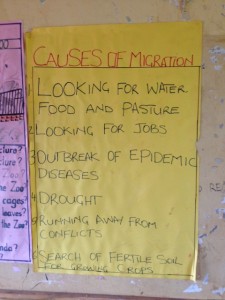 Human migration is a fact of life.
Human migration is a fact of life.
I’d just spent two weeks in Uganda at Kasozi Village, an orphan project my husband built through Uganda Orphans Fund. In the fourth-grade classroom of the Village’s primary school, I noted this yellow poster on the wall. It was sobering to read. You wouldn’t likely see this posted in our 4th grade classrooms.
Later in the Entebbe airport, I watched CNN’s report on a current migration story—Muslim families from the Central African Republic, expelled because of violent conflict.
A school poster, a TV news report—it’s easy to remain detached. But something about sitting next to that grieving man on the airplane touched me deeply—his sorrow crossed into my world.
Almost all of the children in our care at Kasozi Village have experienced migration. Some came from the north where the LRA Army terrorized the nation with a 20-year war. Others traveled from the east near Soroti. They’ve lost parents, siblings and kin, but have remained in their culture, because Uganda Orphans Fund is not an adoption agency.
Yet, I saw many happy faces—kids who are thankful for their home at the Village. That’s Dennis in the green shirt—abducted at age nine to be a child-soldier, forced to kill others. He is now free from condemnation in Jesus. I always give him long hugs.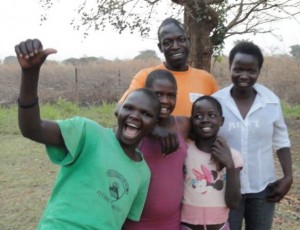
Each time I go, I count it a privilege to hold children on my lap, kiss their heads, and give them small treasures like a sheet of white paper to color or a stick of gum. And though they’ve had unspeakable losses, I see their joy in having a place to call “home.”
In a way, we are all sojourners, migrating through life with various degrees of homesickness. Our dwellings are temporary, our time is short. And as someone said, our job is to walk each other home.
My friend Kristine Price put it this way:
“You will desire to belong, to be connected, to feel treasured. You’ll have glimpses of those things fulfilled, yet there will always be a remnant that’s left empty inside of you. Make friends with this inner emptiness. Accept it. Even welcome it, because it’s telling you something. It’s telling you that you were made for another world…You were made for heaven and to be in the very presence of God who wrote your story. Your inner emptiness whispers this to you. Listen for that whisper. It will awaken your heart to heaven.”
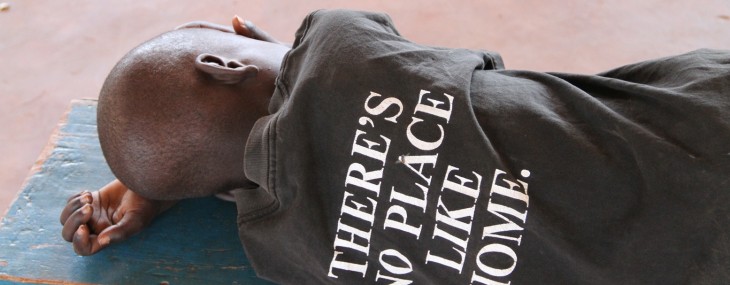
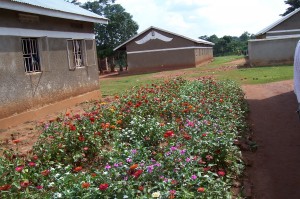
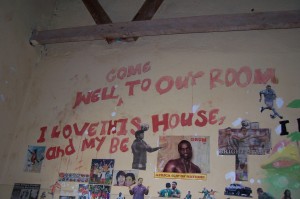







dear susan
this has every element of a gripping story and yet it’s not really a story, it’s the truth. and that is almost too hard to accept. the thought you shared about our job being to walk each other home is a great honor god has given us and such a sweet way to think of our life’s simple work.
welcome home to your temporary one. glad you are back and sharing this powerful stuff.
love
suzee B
Dear Friends,
I failed to give proper attribution in my post “No Place Like Home.” Ram Dass is the person who said our job was to walk each other home, and he was quoted in Anne Lamotte’s book STITCHES. I lent the book to a friend and I couldn’t remember his name, but I found some notes I made about it. I wanted you to know who said it! Like Anne said in her book, I also love that notion, that in the end, that is what we do. We walk together through the stages, the suffering, the loss. And writing this blog is my small effort to walk with you. Thank you for walking with me too.
What a beautiful story. Thankyou so much for being humble enough to share it. Our church helps those in Rwanda, so I understand some of this. If only we so called western world societies would really have a true understanding of family and sociality, rather than putting our elderly in homes and distancing ourselves from suffering! How we hate to be the one who helps the samaritan! My prayer for myself is that may I have the honour to do so.
You painted such a lasting image in my mind of this man leaving his home. God picked you to ease his pain. I love that every day we have “little assignments” from Dad! You are so inspiring. I am grateful you write!!!
Love in any language…..
🙂